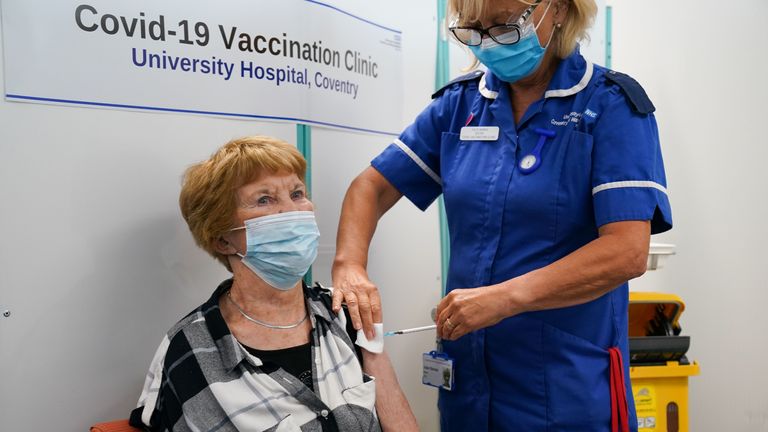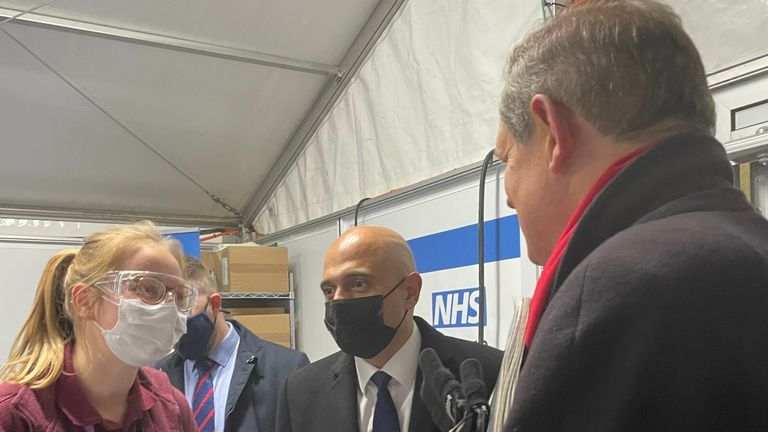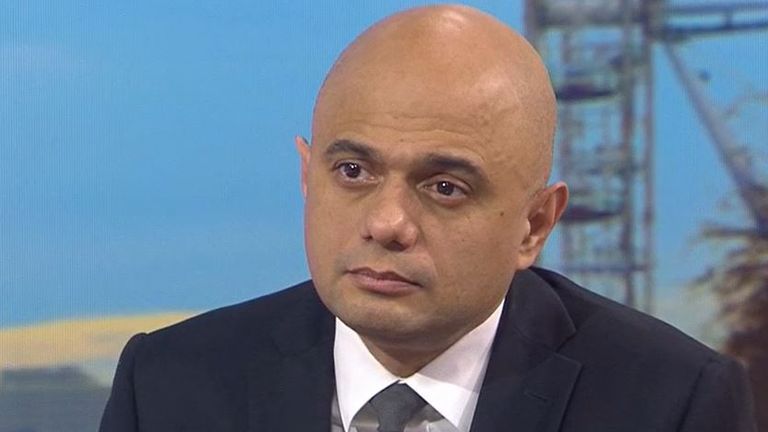COVID-19: UK government secure 114 million more vaccines doses for the next two years as cases of the new Omicron variant rise
The government has signed contracts to buy 114 million more COVID vaccine doses for 2022 and 2023 as UK cases of the new Omicron variant rise to 32.
Health Secretary Sajid Javid said the deals – which involves 60 million additional doses of the Moderna vaccine and 54 million more Pfizer/BioNTech jabs – will help the UK to “buy time” with the new variant.
The additional jabs will make sure the country has enough doses “that we need for the long term”, the health secretary added, as he reiterated that vaccines “still remain our best line of defence”.
The announcement came as identified cases of the new Omicron variant in the UK increased to 32 on Wednesday, with the UK Health Security Agency (UKHSA) confirming that nine more cases have been identified in England and one in Scotland.
Latest COVID updates from the UK and around the world
The UKHSA added that the variant has now been found in the East Midlands, east of England, London, the South East and the North West.
The identified Scottish cases are in Lanarkshire and Greater Glasgow.
On Monday, the government confirmed that all adults will be offered a COVID-19 booster vaccine as part of a far-reaching expansion of the jabs programme to deal with the potential impact of the Omicron variant.
Mr Javid also announced that the gap between second doses and booster jabs will be shortened from six months to three months, and children aged between 12 and 15 will be offered a second dose – again, after no less than three months.
The health secretary added that severely immunosuppressed people will have access to another booster vaccine, meaning for some, a fourth dose this winter.
On Tuesday, it was confirmed that the government’s intends for all those eligible to be offered a booster jab by the end of January.
Announcing the new vaccine contracts on Wednesday, Mr Javid told reporters he accelerated the purchase of more doses “in light of the new variant”.
“Since we learned about this new variant, our strategy has been to buy time – time to assess it, but also to build our defences – and vaccines still remain our best line of defence,” the health secretary said.
“And that is why we announced the huge expansion in our booster programme.
“But I am also pleased to announce that today, that we have signed contracts with Pfizer and Moderna to get an addition 114 million doses of COVID-19 vaccine doses for the next two calendar years.
“I accelerated this purchase in light of this new variant – which includes purchases of modified vaccines – to make sure that we have got the vaccines that we need for the long term.”
Mr Javid added: “These are vaccines from Moderna and Pfizer for 2022 and 2023.
“Obviously [they are] COVID-19 vaccines, but they will be the latest vaccines that they will have. Because as we are seeing right now, there is a new variant, there is potentially new variants in the future.
“We know that COVID is going to be around for a while, we have to learn to live with it, and one of the ways to learn to live with it is to make sure that we have got the vaccines that we need and that they are futureproof.
“And that is just the kind of order we have given for 114 million vaccines to make sure we have got what we need for the long term.”
The health secretary also reiterated his plea for those who have been called up for their booster vaccine to “step up, roll up your sleeves and get protected”.
Not much is known about the new strain but there are fears it could be more contagious and more resistant to vaccines.
On Wednesday, an epidemiologist at the World Health Organization (WHO) said some Omicron cases are experiencing “mild” symptoms and experts should have more information about the transmission of the new COVID variant within days.
At least 23 countries, including the UK, have now reported instances – and the WHO expects that number to rise.
It is hoped measures – including the reintroduction of mask-wearing in some settings in the UK – could buy more time for scientists to gain a greater understanding of the virus.
This measure was brought back in on Tuesday alongside day two PCR tests for travellers returning to the UK.
Close contacts of anyone who tests positive for the new Omicron variant have also been ordered to isolate for 10 days.
“If it emerges that this variant is no more dangerous than the Delta variant, then we won’t keep measures in place for a day longer than necessary,” the health secretary told MPs on Tuesday.
In a press conference on Tuesday, Prime Minister Boris Johnson urged people not to cancel Christmas parties or school nativity plays, telling a Downing Street press conference he would “throw everything” at the booster vaccination campaign to tackle the variant’s spread.
He added that 400 military personnel will help the NHS to deliver the expanded booster programme and vaccination centres will be “popping up like Christmas trees”.
Mr Javid reiterated this message on Sky News on Wednesday, insisting that people should carry on with their plans for Christmas but should take a COVID lateral flow test before attending events.
His comments came despite a UK health chief encouraging Britons to cut back on unnecessary socialising ahead of the festive season.
Dr Jenny Harries, chief executive of the UK’s Health Security Agency (UKHSA), said everyone could do their bit to tackle the spread of the new variant by reducing the number of social contacts they have – and by “not socialising when we don’t particularly need to”.
Saffron Cordery, deputy chief executive of NHS Providers, which represents NHS trusts, told Sky News some NHS organisations have asked staff “not to mix in big groups” in the run-up to Christmas owing to fears off staff absences.
She said this year is “very different” to last year when “it was absolutely clear that nobody was going to a Christmas party”, adding that the situation is “a really challenging and difficult one”.
The government said, as of 9am on Wednesday, there had been a further 48,374 lab-confirmed COVID-19 cases in the UK and that a further 171 people had died within 28 days of testing positive.
A total of 50,994,257 first doses of vaccines had been delivered in the UK by 30 November 30, government figures show.
Source: Read Full Article






